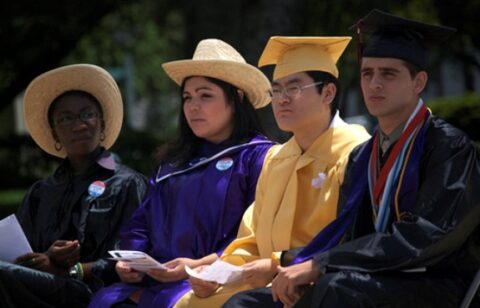Immigration Reform

Young, Professional DREAMers Deserve Recognition
Earlier this week, numerous media outlets covered the story of Jose Godinez-Sampiero, a DREAM Act-eligible law school graduate whose application for a law license is currently pending before the Florida Supreme Court. Similar stories are playing out in California and New York, as young people brought to this country as children are now law school graduates, trying to make use of their professional degrees. The problem isn’t just for young lawyers, however, but is faced by many DREAMers, such as Dulce Matuz, an engineer turned DREAM Act advocate, who made Time Magazine’s Top 100 list this week. Read More

FAIR’s Economic Analysis of HB56 Ignores Reality in Alabama
While the original sponsors of Alabama’s extreme anti-immigrant bill HB56 have acknowledged that the law is deeply flawed, as evidenced by a new bill to modify some of the harsher provisions, the restrictionist stalwarts at the Federation for American Immigration Reform (FAIR) want Alabamians to remember what it has supposedly done for the state. In a recent article, FAIR continues to make the unsubstantiated claim that HB56 is exactly what Alabama’s economy and workers need. It does this by using its trademark technique of pitting Alabama’s native-born workers against immigrants and their children, many of whom are U.S. citizens. Read More

Colorado, Hawaii and Delaware Progress on Tuition Equity for Undocumented Students
Legislation intended to make college education more affordable for undocumented students continues to work its way through state legislature across the U.S. Last week, the Colorado Senate approved SB 15 (or ASSET), a tuition equity bill that would provide a standard tuition rate to qualifying students regardless of immigration status. Likewise, bills in Hawaii and Delaware which provide in-state tuition and financial aid to eligible students regardless of status are also moving through their respective legislatures. Currently, twelve states have laws on their books that permit certain undocumented students who have attended and graduated from their primary and secondary schools to pay the same tuition as their classmates at public institutions of higher education. Read More

Appellate Court Hears Arguments in Case Challenging DOMA, Bi-National Married Couples File New Suit
Same sex couples face often insurmountable hurdles when it comes to immigration status. Under the Defense of Marriage Act (“DOMA”), lesbian and gay U.S. citizens and lawful permanent residents are barred from obtaining immigrant visas for their spouses. When Congress enacted DOMA in 1996, no state celebrated marriages between gay and lesbian couples. But, the landscape has changed. Today, lesbian and gay couples in six states plus the District of Columbia have the freedom to marry under state law. This welcome progress, however, does not help the estimated 36,000 lesbian and gay bi-national couples living in the United States. Because DOMA prohibits immigration authorities from recognizing same sex marriages that are legal under state law, bi-national married couples continue to face potential separation. However, last week brought us closer to immigration equality for lesbian and gay couples. Read More

USCIS One Step Closer to Adopting Improvement to Immigration Waiver Process
A provision of the immigration law commonly known as the “3 and 10 year bars” has proven to be one of the most heart-breaking of the many draconian changes made to the immigration law at the time. Since its enactment in 1996, the provision—which imposes re-entry bars of 3 to 10 years on immigrants who are present in the U.S. illegally, leave the U.S., and want to re-enter lawfully—often separates family members, even if they are otherwise entitled to legal status in the U.S. Now, however, USCIS has published a proposed rule that will reduce, although not eliminate, the hardships created by this provision of law. The announcement has been received favorably, although with some skepticism, within the immigration community. Read More

Mississippi Lawmaker Kills State’s Extreme Immigration Bill, Although Immigration Provisions May Loom
Today, Mississippi’s extreme immigration bill, HB 488, died after a state senate committee chairman decided not to bring the bill up for a vote. The Mississippi Senate had until today to consider HB 488, a bill that would have, among other things, allowed police officers to determine the immigration status of individuals they “reasonably suspect” are in the country without documents. While HB 488 is dead, however, state House members may still be looking to keep these immigration enforcement measures alive by inserting them in other bills. Read More

ICE Deported More Than 46,000 Immigrants with U.S. Citizen Children Last Year, Report Finds
Immigration enforcement and deportation have a particularly devastating impact on mixed status families, that is, families who have one or more direct members who are undocumented. When parents are deported, families face impossible decisions about whether their family will be separated or whether U.S. citizen kids will be de facto deported along with their parents. New numbers released in a report by Immigration and Customs Enforcement (ICE) show the extent of the issue. The new report finds that, between January and June 2011, ICE deported over 46,000 immigrants who claimed to have at least one U.S. citizen child. Read More

Congressional Budget Cuts Threaten Vital USCIS Integration Grant Program
This month, United States Citizenship and Immigration Services (USCIS) announced $5 million in government grant opportunities available to service providers who help immigrants integrate and prepare for the naturalization exam. The money for these grants, awarded through the Citizenship and Integration Grant program, however, was not appropriated through Congress. Congress actually voted not to fund this vital program, leaving USCIS to cut costs elsewhere in order to keep the program afloat. Read More

DREAM Advocates Begin a 3,000-mile March from California to Washington
Jose Gonzalez was born in Guadalajara, Mexico in 1987, but he has called California home for almost all of his 25 years. A community college graduate, as well as a youth minister in his church, Jose wants to attend a four-year university, but his family cannot afford tuition, and he cannot work to pay his own way. Like many others in his situation, Jose grew up as an American—speaking English, attending school, thinking about college and careers—only to learn one day that his presence here is not legal. Read More

Latinos in North Carolina: A Growing Part of the State’s Economic and Social Landscape
North Carolina has become a hub of Latino migration to the South. While many think this migration came suddenly, North Carolina has, in fact, been welcoming and integrating Mexican and other Latino migrants for generations. Over the last three decades, the Latino population in North Carolina grew from less than a half percent of the total population to 8.4 percent—more than 800,000 people. North Carolina, which now has more agricultural guest workers than any other state in the nation, has contributed to a quickly growing national population of 50 million Latinos, now the largest minority group in the country. But much is at stake for Latinos, native and newly arrived, as the state and region experience demographic transformation. The polarized nature of the current immigration debate has made the steady growth of Latinos in North Carolina more noticeable and more politically charged. The role of Latinos in North Carolina, however—as workers and residents—is an important and over-looked story of how North Carolina continues to grow and evolve in a changing economy and world. Read More
Make a contribution
Make a direct impact on the lives of immigrants.
